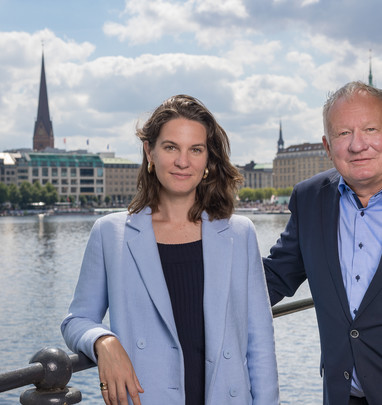Hamburg@work has been connecting the digital economy since 1997. Its ideas provider, face and Chief Executive Uwe Jens Neumann has been shaping North Germany’s largest digital cluster, an alliance of Hamburg businesses, right from the start. Here, he and Communications Director Dr. Anna Schwan report on the early years of the initiative, the vision of Hamburg as a smart city and the digital future of the Hanseatic City’s most important economic clusters.
What exactly does Hamburg@work do?
Neumann: “As an association, Hamburg@work has been organizing a wide variety of events for the digital economy in Hamburg for the past 20 years. The only thing that has changed is that we used to focus exclusively on the media industry, whereas now the digital transformation has reached all areas of the economy.”
How did Hamburg@work come about?
Neumann: “As far back as late 1995, the Hamburg Business Development Agency arranged the first meeting of ‘Hamburg Online Captains’ for Internet-savvy businesses, a really innovative move at the time. After a short while, the assembly of online captains evolved into the Förderkreis Multimedia sponsoring group, which with the help of the then-Economic Affairs Senator Dr. Thomas Mirow became the public-private partnership ‘Hamburg-newmedia@work’, and eventually Hamburg@work. Our membership numbers soared around that time.”
“We have always believed the Internet and digitalization would herald in a fundamental change.”
In that, you were riding the dot-com wave of the late 1990s. Did you already have the notion then of making Hamburg the Internet hub?
Neumann: “The Internet hype helped us sign up 800 members within the space of a few months, the white membership card was a status symbol on the scene and your entrance ticket to the hottest events. But when the Internet bubble burst in 2001, far from pulling back we kept on going. We have always believed the Internet and digitalization would herald in a fundamental change.”
Schwan: “I was floating around in this primordial soup at Hamburg@work, at that time as a student assistant. And I recall very vividly the sense of a new beginning. We thought digital business models would change the world within a very brief time frame – which is what happened. Even if share prices initially slumped in 2001.”
What was your biggest achievement in those 20 years?
Neumann: “Most definitely the creation of the Hamburg IT Strategy Days 15 years ago. That small meet has evolved into the leading conference in the German-speaking world, where most CIOs congregate. Though all other Hamburg@work event formats also helped to raise our profile, the IT Strategy Days clearly demonstrated our shift in focus from the media industry to digital topics spanning the entire economy.”
What are you doing to make Hamburg a smart city in every area, in other words so to promote and use digitalization as something that benefits everyone?
Neumann: “With Hamburg@work, we want to become THE digital cluster in the metropolitan region by 2025 at the latest. In other words, we are taking an interdisciplinary approach to promoting digitalization projects because the disruption to the IT and media world that we have seen in recent years will also become a feature of all branches of the economy. We want to support Hamburg’s main economic clusters in that regard, in other words logistics, life science, aviation, renewable energies and the maritime economy. We are currently discussing cooperations with the logistics and health management clusters.”
Schwan: “Hamburg has plenty of potential to champion the digital transformation. But the city needs a network of the various branches of the economy: There are so many parallel initiatives and propositions, but interaction between the clusters is too low. Yet digital disruption occurs specifically as a result of this interdisciplinary approach. We want to launch further propositions to consolidate Hamburg’s role in Germany’s transformation. Another future topic that specifically affects communication is ‘innovation branding.’ Only brands that present themselves as innovative, social, digital and human will be viable within their target groups.”
“Digitalization is the biggest political and social challenge of our age.”
What is your vision for Hamburg in 15 years’ time?
Schwan: “Digitalization is the biggest political and social challenge of our age and will bring people both economic and social advantages, for example flexible and digital worlds of work, communication and education opportunities for all, and permanent access to information.
Neumann: “The smart city Hamburg, with partners from business, is planning projects in the areas of transport, street lighting management, residents’ services and port logistics. In 15 years, Hamburg could be one of the most attractive cities in Europe if it succeeds in championing the continuing economic and social development that will make it a real smart city. A flourishing retail sector that has evolved into digital retail and now only uses shops to convey brand feel, manufacturing Industry 4.0 that custom finishes electrical components supplied by 3D printing and robots, and quieter downtown districts thanks to quiet electric cars are just a few specific aspects that occur to me.”
Just how digital has your life already become?
Schwan: “My life is extremely digital – music and video streaming and Netflix series, or Chromecast before I go to sleep. My agency relies on a cloud server, enabling us all to work on any content wherever we are. Office management apps facilitate our day-to-day work. But sometimes I do need to escape from the digital bubble – into the real natural world, and feel the wind, weather and earth.”
Neumann: “I especially enjoy music, I’m a real expert at Sonos. I am also captivated by the smart home idea. I always know when the cleaner or kids have come through the door, can water the plants and lawn by app when I am on vacation, and just before I return home I can switch the heating back on remotely.”
